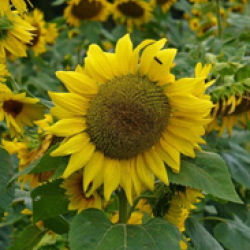Source Institutions
Source Institutions
Add to list Go to activity

In this activity, learners conduct an experiment to investigate the effect of elevated levels on CO2 on plant growth. The activity helps learners understand the relationship between CO2, plants, and climate change. This activity is associated with Project BudBurst, a citizen science program for K-12 learners. [Activity is publicly available through a web crawler capture on Archive.org.]
- 10 to 30 minutes
- 1 to 4 weeks
- $10 - $20 per group of students
- Ages 14 - 18
- Activity, Experiment/Lab Activity, Lesson/Lesson Plan
- English
Quick Guide
Materials List (per group of students)
- Two 2-liter clear soda bottles for each team of two learners
- One plastic saucer for each bottle
- Knife
- Scissors
- Tape
- Potting soil (enough to fill the bottom of the bottles)
- Seeds of several different species of plants (tomato, wheat, bean, cucumber, clover, etc)
- Water soluble plant food
- Straws
- Hand pump (often sold as balloon pumps or aspirators)
Subjects
-
Earth and Space Science
-
Earth Structure
- Atmosphere
-
Earth Structure
-
Life Sciences
- Cells
-
Diversity of Life
- Plants
-
Ecology
- Ecosystems
- Populations
- Human Impact
-
Physical Sciences
- Chemistry
-
Mathematics
-
Data Analysis and Probability
- Data Analysis
- Data Collection
- Data Representation
- Representation
-
Data Analysis and Probability
Informal Categories
- Citizen Science
- Nature and Environment
Audience
To use this activity, learners need to:
- see
- read
- touch
Learning styles supported:
- Involves teamwork and communication skills
- Involves hands-on or lab activities
Other
Includes assesments for student learning:
This resource is part of:
Access Rights:
- Free access
By:
Rights:
- All rights reserved, NEON Inc., 2013
Funding Source:
- National Science Foundation
